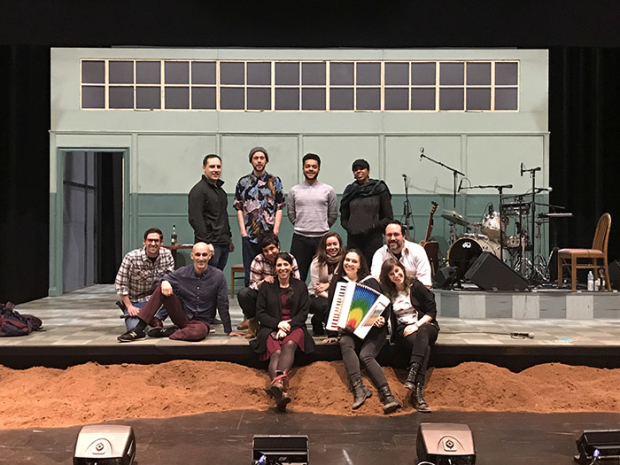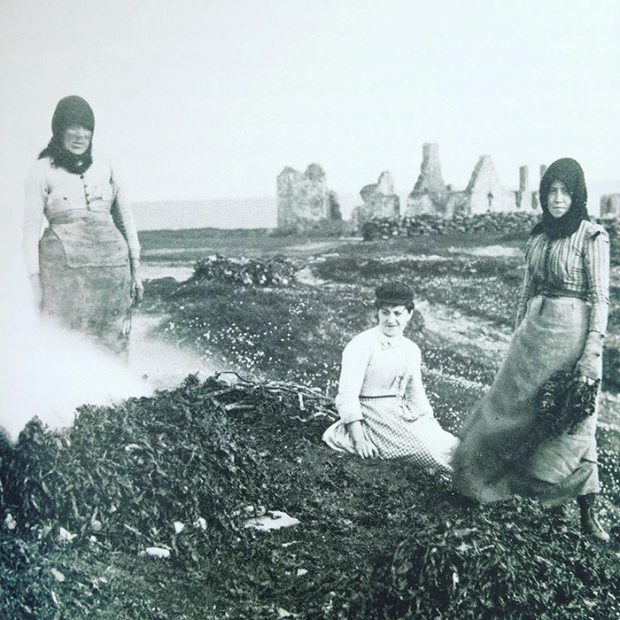First Person: Sex, Politics, and Regional Control
Jessica Almasy discusses the challenges of bringing ”Anything That Gives Off Light” to the stage.

(photo provided by Matt Ross PR)
My theater company, the TEAM, and the National Theatre of Scotland, have been collaboratively building a play in and about Scotland and Appalachia called Anything That Gives Off Light since 2014. The play looks at national identities in these two regions and the stories we tell ourselves about ourselves through the lens of a West Virginian woman and two Scotsmen. We open for a run at Joe's Pub on March 14, but recently, we returned to Appalachia to give one performance for free at a three-day artistic exchange led by Amy Brooks and Hilarie Spangler of Cardinal Cross with their affiliates at Appalshop, Arts in the Gap, and a trove of local organizations.
Throughout the process of procuring resources for our performance, we found that the public face and practiced power of leadership in this region remains the jurisdiction of white men, and yet, there are deeply invested women doing some incredibly heavy lifting. Just as — if not more — importantly than making sure they're getting credit for it, there is an opportunity here to source the logistical, financial, and energetic power to magnify these efforts.
Amy and her colleagues have worked closely with the TEAM administration to bring us not only to the community but into the community. As an artist who has trained, taught, and practiced for 20 years in New York, both making work experimentally and as a profession, it has been a real and legitimate spinal-fluid-level turn to accept and self-select that I am responsible for finding pathways toward intimacy with the America I am seeking to make art with (not about). If we're not in honest, equitable, frank conversation in which we are authentically willing to be proved wrong, we risk stealing stories and reconfiguring them until they're so laden with our own kaleidoscopic bias that we've made a violent extraction of invaluable essence, without regard for the practical and spiritual consequence.

(photo provided by Matt Ross PR)
But what if we make ethical contracts toward a timely if not immediate replenishment? For me, that means I need to spend my own money here in Appalachia, my time here; I need to put some skin in the game, and something of my own life needs to be at stake. So the question of making art in America, particularly the bits that feel foreign, becomes less about investigations and more about investing.
I wonder what could happen if we task the powerful, vivacious, loudly feminist, wildly outspoken and flourishing New York female producers and activist administrators — working independently and in collectives — with getting interested in and educated about our sisters working in this deeply impoverished region that is so politically heated and complicated and culturally rich. What if we could amplify them, advocate for them, and lift their causes up on our platforms, on Instagram, at work lunches, and in gala speeches? And not just as a favor or because it is a momentarily-right-thing-to-do but because we are truly getting excited, because we feel as if their work is truly our work. If we care about how people in our country vote, how can we also cultivate the care to understand how they live? What if we reminded ourselves every day in New York that domestic cultural exchange in America is multidirectional?
Members of the company will be available in New York after the show at Joe's Pub every night to speak with our audiences and everyone who's interested, carrying with us everything we've learned in Appalachia and the possibilities of everything we don't know.






![0928 Cleveland MatteoLane 2024 1200x1200[98] copy](https://www.theatermania.com/wp-content/uploads/sites/4/2024/10/0928_Cleveland_MatteoLane_2024_1200x120098-copy.jpeg?w=300)



